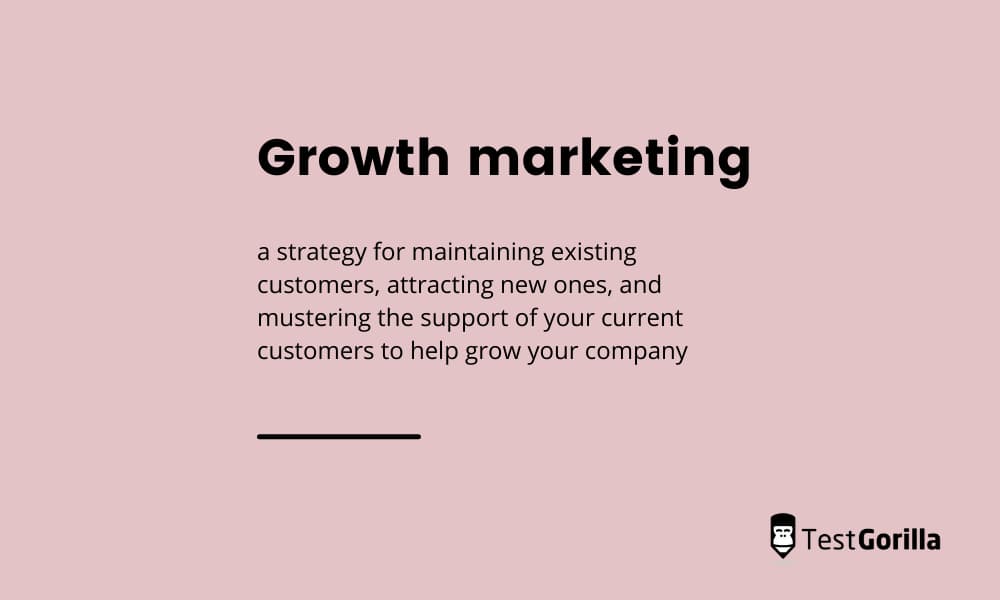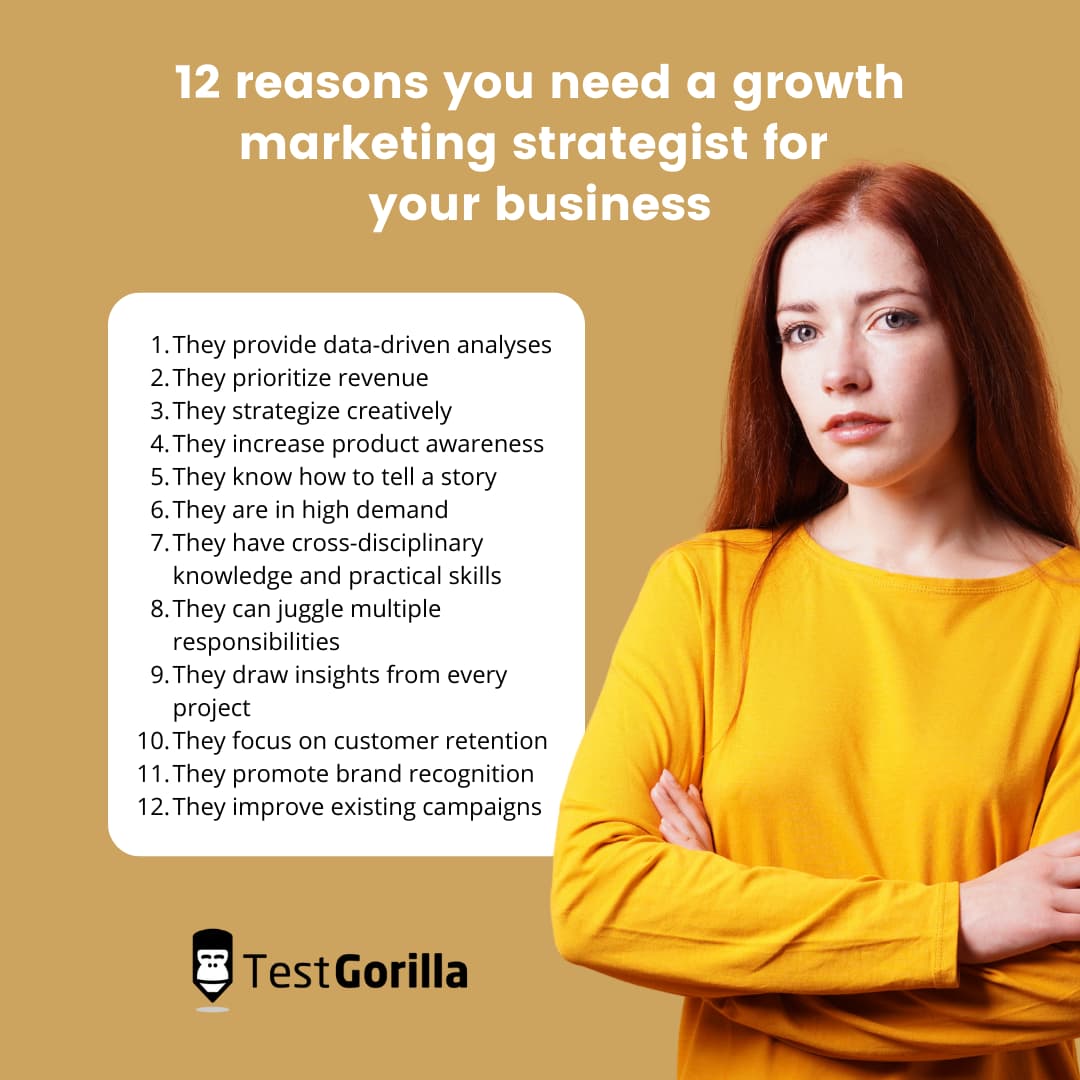12 reasons a growth marketing strategist is crucial for your business
Growth marketing drives digital transformation that makes your organization more appealing to prospective customers. It improves your digital footprint to optimize customers’ experience.
Every year, more than 500,000 new companies are formed in the US, many of which have high marketing budgets.[1] With such stiff competition, it’s difficult for organizations to stand out with unique, profit-oriented ideas.
Therefore, you need a growth marketing strategist to increase organic business growth and customer acquisition.
This article discusses how a growth marketing strategist can help you make a difference in the market and bolster your operations.
What is growth marketing?
Growth marketing is a strategy for maintaining existing customers, attracting new ones, and mustering the support of your current customers to help grow your company. It involves using data and metrics to expand your customer base.
Traditional marketing usually relies on using a particular technique over time.
In contrast, growth marketing is concerned with the entire marketing funnel and includes data that considers users’ unique desires and questions throughout the marketing funnel.
A marketing funnel represents a prospective customer’s journey toward buying your product or service. It consists of four stages: awareness, interest, consideration, and conversion. The customer goes through each stage before buying from your business.
Who is a growth marketer?
Growth marketers run regular repetitive tests throughout the marketing funnel and use the results to craft data-driven strategy updates that lift key performance metrics. In other words, they examine your organization’s marketing closely to gain deeper insights into how to help the company grow.
A growth marketer is a data-directed pro who tries to find creative and fresh ways to drive user acquisition, engage and retain customers, and improve your brand overall. They experiment at every stage of the hiring funnel to ensure they achieve great results.
The best insights on HR and recruitment, delivered to your inbox.
Biweekly updates. No spam. Unsubscribe any time.
What are the core components of a growth marketing strategy?
A growth marketing manager focuses their marketing strategy around various metrics, including conversion rates, customer retention rates, customer acquisition rates, and customer lifetime value.
These components normally exist in the e-commerce space, but traditional street-side businesses that offer products and services to customers face to face can also use them.
Below are some of the key components of a growth marketing strategy:
A/B testing: This type of testing exists in several formats, including email marketing, landing pages, and social media ads. It removes all forms of guesswork from website optimization.
A/B testing is a randomized experimentation technique that compares various versions of an ad to identify the one with the greatest impact and that drives specific KPIs the most.
Cross-channel marketing: Customers expect you to be able to readily offer them a simple integrated service experience that caters to their interests and preferences.
Cross-channel marketing enables you to engage with your consumers or prospective customers across digital marketing channels and devices. This component is valuable because it helps you to build a holistic marketing plan that integrates multiple channels.
Customer lifecycle: This method of communicating with customers involves deploying various marketing messages and methods and recognizing the different stages of client loyalty.
12 reasons you need a growth marketing strategist for your business
Growth marketing involves more than just creating a new, never-before-seen method of attracting customers. Growth marketing strategists form a well-thought-out strategy for companies that begins with a long-term goal.
Below are some of the benefits of having a growth marketing strategist on your team:
1. They provide data-driven analyses
Skilled growth marketing strategists have a strong understanding of performance data and know which indicators to examine in every circumstance.
Modern growth marketing strategists determine the best strategies for your organization using appropriate data analysis techniques.
2. They prioritize revenue
Normally, traditional marketing emphasizes top-of-funnel techniques, such as brand recognition. On the other hand, growth marketing strategists delve deeper into the funnel with a focus on revenue generation.
3. They strategize creatively
Top growth marketing managers think creatively to improve your company’s marketing execution. Although this might not be in a typical job description for a growth marketer, it will help improve the quality of your company’s marketing.
4. They increase product awareness
The goal of growth marketing strategists is not to trick customers into buying something they don’t want but rather to inform them of the many benefits of the product or service. By following this strategy, growth marketers can help market your company to uninformed customers.
5. They know how to tell a story
Growth marketing strategists can tell compelling stories that resonate with your potential customers. Having all the data in the world won’t help you connect with your audience if you don’t make accurate inferences to gain reliable insights.
6. They are in high demand
In today’s world, every company’s marketing strategy revolves around growth marketing. The employment of growth marketers is expected to grow by 10% from 2020 to 2030. As growth marketing increases, more businesses will require it, making it the future of marketing.
7. They have cross-disciplinary knowledge and practical skills
Growth marketing managers use data to model plans, discover what works, and test new trials. As such, growth marketing strategists understand what data is important in relation to channel execution, strategy, and optimization efforts.
8. They can juggle multiple responsibilities
Effective growth marketers are results driven but comfortable with ambiguity. Therefore, they can handle multiple tasks to ensure that they use data and analyses effectively to improve your marketing structure.
9. They draw insights from every project
Growth marketers generally learn from every project, whether it’s a success or failure. They usually see it as the quickest way to gain valuable insights into the best strategy to implement.
With a proficient growth marketing strategist on your team, your organization will thrive and pull ahead of your competitors.
10. They focus on customer retention
Growth marketers prioritize customer retention and increasing customer loyalty. Retention-focused strategies bolster a customer’s lifetime value and experience with your business.
11. They promote brand recognition
Growth marketing strategists promote brand recognition to encourage customers to identify with your brand. They help expand your brand’s presence and visibility to its target audience, increasing revenue in the long run.
12. They improve existing campaigns
Growth marketers take leads from existing campaigns, gather data on the consumers’ habits, and then use the information they’ve collected to create innovative strategies. This helps them to develop new campaigns and improve existing ones.
Hiring good growth marketing strategists is an investment in your business
Given our exhaustive list of the benefits of hiring growth marketing strategists, it’s clear that these experts will add immense value to your company.
You can attract top candidates to your business by writing a growth marketer job description that describes the marketer you want and why they should work for your business.
TestGorilla’s growth marketing test makes finding top growth marketers easy. It enables you to objectively assess the skills of candidates who apply for this role in your organization.
You can determine their expertise with growth gaps, funnel management, conversion optimization, and more. If you want to harness these benefits to employ the best, sign up for free with TestGorilla today.
Sources:
“Business Formation Statistics”. United States Census Bureau. Retrieved August 10, 2022.
You've scrolled this far
Why not try TestGorilla for free, and see what happens when you put skills first.




















